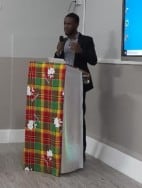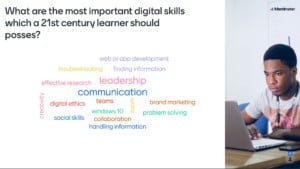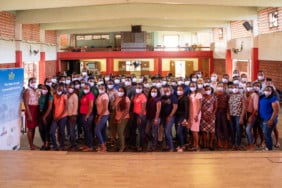A Youth-led and Youth-centered Approach to Building Digital Resilience
August 12th, 2022 | Blogs
In the wake of the COVID-19 pandemic, ongoing socio-economic instability continues to have a devastating impact on youth employment, education, and mental health. For youth in Saint Lucia, the closing of schools and training centers has impacted their education and training opportunities, and the shift to remote learning has deepened the “digital divide” in which those without access to resources for remote learning are now even further left behind. The decrease in youth earnings and earning potential resulting from this situation is negatively affecting youth’s mental health and optimism towards the future.
Through the Saint Lucia ConnectEd Activity, World Education, in partnership with The Saint Lucia Ministry of Education and Sir Arthur Lewis Community College (SALCC), is supporting Saint Lucian youth in navigating these challenges by developing a diversified learning environment, accessible to students with different needs and ability levels, focused on employability skills that will translate to post-secondary employment and education.
 The ConnectEd Activity is grounded in positive youth development (PYD) philosophy, placing youth at the center of the design and implementation of activities, giving youth opportunities to build their workforce skills while building local ownership into the program. Working closely with the Saint Lucia National Youth Council, the project has developed a Youth-Led Advisory Board (Y-LAB) made up of youth leaders from youth-led organizations and groups across St. Lucia. The Y-LAB plays a key role in contributing to the project design and co-leading activities. Furthermore, in alignment with the PYD framework, and in order to actualize a youth–centered and youth-led approach, effectiveness of ConnectEd approaches and tools is being investigated by youth researchers from the Saint Lucia National Youth council. This approach builds youth capacity in designing and carrying out action research while gathering the information needed to support the evidence base of best practices and lessons learned and inform future decision-making and possible scale-up.
The ConnectEd Activity is grounded in positive youth development (PYD) philosophy, placing youth at the center of the design and implementation of activities, giving youth opportunities to build their workforce skills while building local ownership into the program. Working closely with the Saint Lucia National Youth Council, the project has developed a Youth-Led Advisory Board (Y-LAB) made up of youth leaders from youth-led organizations and groups across St. Lucia. The Y-LAB plays a key role in contributing to the project design and co-leading activities. Furthermore, in alignment with the PYD framework, and in order to actualize a youth–centered and youth-led approach, effectiveness of ConnectEd approaches and tools is being investigated by youth researchers from the Saint Lucia National Youth council. This approach builds youth capacity in designing and carrying out action research while gathering the information needed to support the evidence base of best practices and lessons learned and inform future decision-making and possible scale-up.
 Key to program success is the expansion of teacher effectiveness in integrating both digital skills and PYD approaches into instruction via sustainable strategies and practices that can be replicated and scaled. To accomplish this, the Saint Lucia ConnectEd Activity has employed two main tools: the EdTech Integration Action Plan and the EdTech Makerspace (ETMS). The theory of change behind this approach is that IF Saint Lucian educators and youth are supported to integrate technology and digital skills development within teaching and Positive Youth Development (PYD) approaches, THEN Saint Lucian educators and youth will build their “digital resilience” and gain problem-solving, critical thinking, and soft skills that will help them to build confidence and attain vital workplace skills needed to reach their personal, academic, career, and civic potential.
Key to program success is the expansion of teacher effectiveness in integrating both digital skills and PYD approaches into instruction via sustainable strategies and practices that can be replicated and scaled. To accomplish this, the Saint Lucia ConnectEd Activity has employed two main tools: the EdTech Integration Action Plan and the EdTech Makerspace (ETMS). The theory of change behind this approach is that IF Saint Lucian educators and youth are supported to integrate technology and digital skills development within teaching and Positive Youth Development (PYD) approaches, THEN Saint Lucian educators and youth will build their “digital resilience” and gain problem-solving, critical thinking, and soft skills that will help them to build confidence and attain vital workplace skills needed to reach their personal, academic, career, and civic potential.
In EdTech Integration Action Plan training and accompanying Community of Practice peer support groups, Saint Lucian educators from five prioritized subject areas have started: engaging in sequenced activities around prioritizing digital skill focus areas; evaluating student goals, needs, and motivations with considerations around access and learning context; identifying edtech integration strategies and activities that fit subject areas to integrate PYD; associated edtech tools; developing their EdTech Integration Action Plans.

The second tool, the EdTech Makerspace, is a professional development model focused on co-creation, adaptation, or curation of Open Educational Resources (OER) in a service learning model. In the EdTech Maker space process, Saint Lucian educators learn to evaluate OERs for different learning goals, curate quality resources through a crowdsourcing model, and use activity templates for creating new OERs to use in their own instruction and share across Saint Lucia. They will look to engage youth as well in contributing to the creation of new OERs, teaching them new digital skills as they engage in activities such as finding cultural and context-relevant photos and examples to use in curriculum.
Pilot training was completed in July 2022, and training of additional cohorts of educators will continue September 2022 – March 2023. It is anticipated that from this training, and subsequent classroom implementation, educators will experience an increase in comfort and confidence in effectively integrating technology and PYD approaches within instruction and student’s will experience an increase in social and cognitive competence, self-efficacy, and connection with work, peers, and community.
World Education fosters enduring partnerships across regions and sectors to advance education outcomes for all. We offer education systems strengthening, program design and implementation, applied research and evaluation, capacity development, and policy development services.